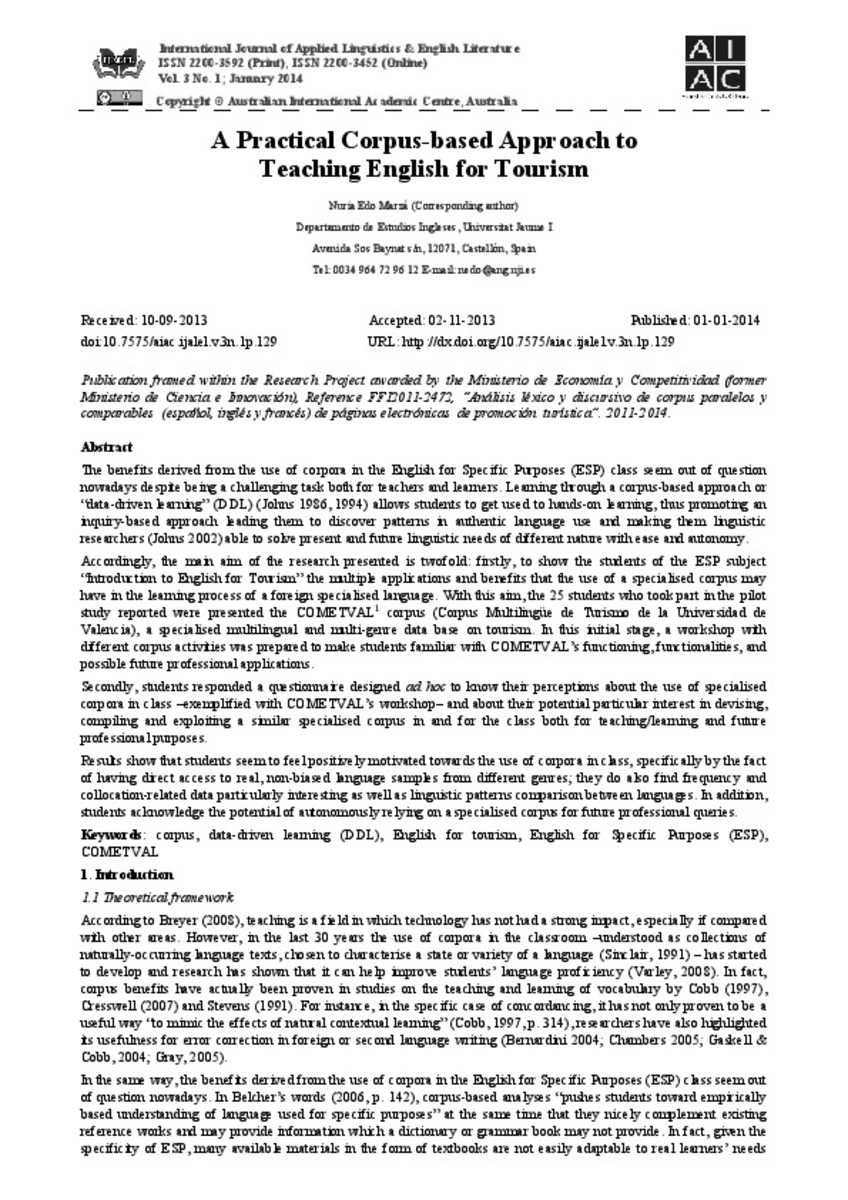Mostrar el registro sencillo del ítem
A Practical Corpus-based Approach to Teaching English for Tourism
| dc.contributor.author | Edo-Marzá, Nuria | |
| dc.date.accessioned | 2015-02-03T08:25:22Z | |
| dc.date.available | 2015-02-03T08:25:22Z | |
| dc.date.issued | 2014-01 | |
| dc.identifier.citation | MARZÁ, Nuria Edo. A Practical Corpus-based Approach to Teaching English for Tourism. International Journal of Applied Linguistics and English Literature, 2014, vol. 3, no 1, p. 129-136. | ca_CA |
| dc.identifier.uri | http://hdl.handle.net/10234/113739 | |
| dc.description.abstract | The benefits derived from the use of corpora in the English for Specific Purposes (ESP) class seem out of question nowadays despite being a challenging task both for teachers and learners. Learning through a corpus-based approach or “data-driven learning” (DDL) (Johns 1986, 1994) allows students to get used to hands-on learning, thus promoting an inquiry-based approach leading them to discover patterns in authentic language use and making them linguistic researchers (Johns 2002) able to solve present and future linguistic needs of different nature with ease and autonomy. Accordingly, the main aim of the research presented is twofold: firstly, to show the students of the ESP subject “Introduction to English for Tourism” the multiple applications and benefits that the use of a specialised corpus may have in the learning process of a foreign specialised language. With this aim, the 25 students who took part in the pilot study reported were presented the COMETVAL1 corpus (Corpus Multilingüe de Turismo de la Universidad de Valencia), a specialised multilingual and multi-genre data base on tourism. In this initial stage, a workshop with different corpus activities was prepared to make students familiar with COMETVAL’s functioning, functionalities, and possible future professional applications. Secondly, students responded a questionnaire designed ad hoc to know their perceptions about the use of specialised corpora in class –exemplified with COMETVAL’s workshop– and about their potential particular interest in devising, compiling and exploiting a similar specialised corpus in and for the class both for teaching/learning and future professional purposes. Results show that students seem to feel positively motivated towards the use of corpora in class, specifically by the fact of having direct access to real, non-biased language samples from different genres; they do also find frequency and collocation-related data particularly interesting as well as linguistic patterns comparison between languages. In addition, students acknowledge the potential of autonomously relying on a specialised corpus for future professional queries. | ca_CA |
| dc.format.extent | 8 p. | ca_CA |
| dc.format.mimetype | application/pdf | ca_CA |
| dc.language.iso | eng | ca_CA |
| dc.publisher | Australian International Academic Centre | ca_CA |
| dc.relation.isPartOf | International Journal of Applied Linguistics & English Literature, Vol. 3 No. 1; January 2014 | ca_CA |
| dc.rights | Copyright © Australian International Academic Centre, Australia | ca_CA |
| dc.rights | Attribution 4.0 Spain | * |
| dc.rights.uri | http://creativecommons.org/licenses/by-sa/4.0/ | * |
| dc.subject | corpus | ca_CA |
| dc.subject | data-driven learning (DDL) | ca_CA |
| dc.subject | English for tourism | ca_CA |
| dc.subject | English for Specific Purposes (ESP) | ca_CA |
| dc.subject | COMETVAL | ca_CA |
| dc.title | A Practical Corpus-based Approach to Teaching English for Tourism | ca_CA |
| dc.type | info:eu-repo/semantics/article | ca_CA |
| dc.identifier.doi | http://dx.doi.org/10.7575/aiac.ijalel.v.3n.1p.129 | |
| dc.rights.accessRights | info:eu-repo/semantics/openAccess | ca_CA |
| dc.type.version | info:eu-repo/semantics/publishedVersion |
Ficheros en el ítem
Este ítem aparece en la(s) siguiente(s) colección(ones)
-
ANG_Articles [302]








